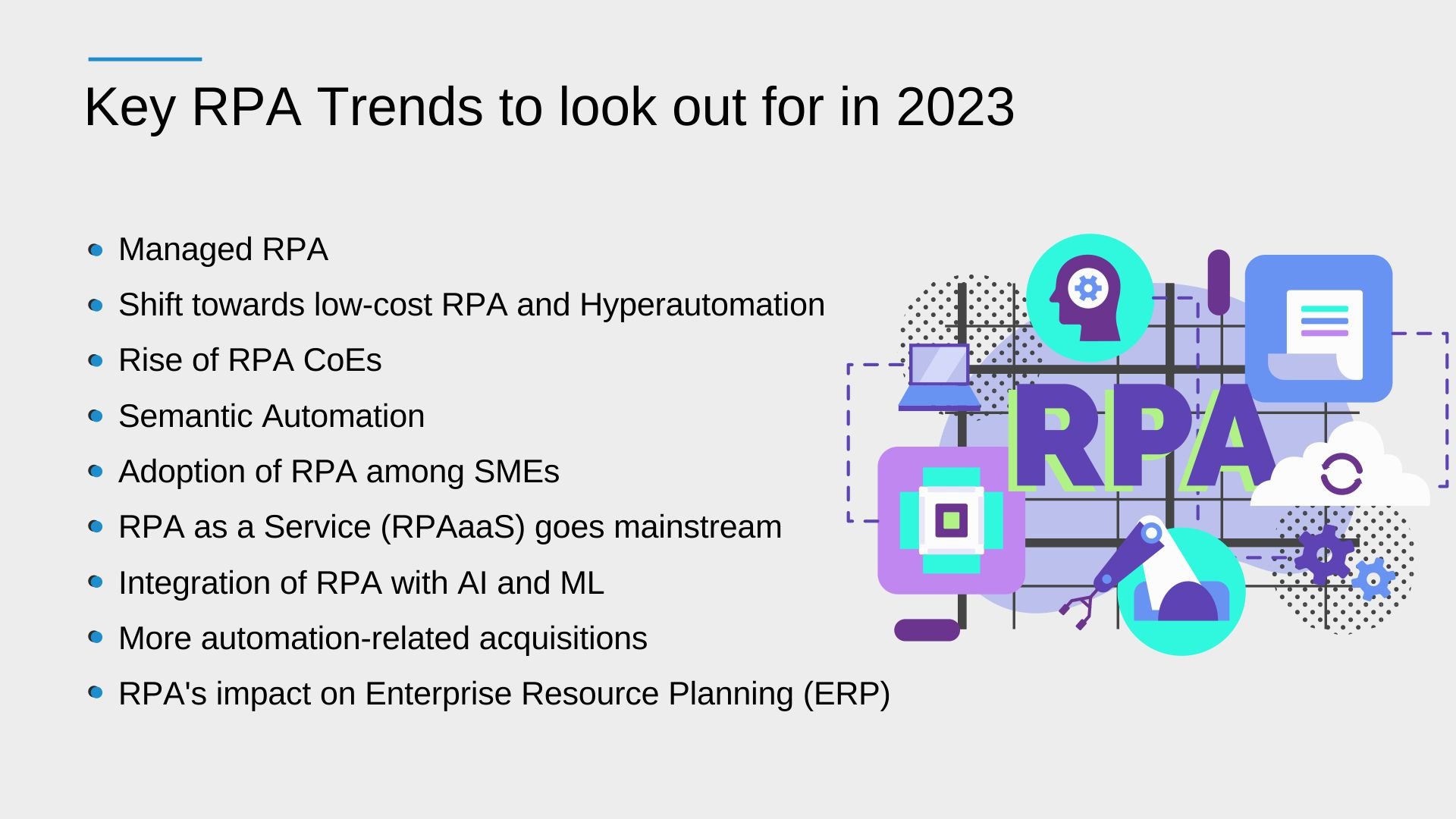RPA (Robotic Process Automation) has emerged as a rapidly growing technology in the tech industry, enabling businesses to automate processes and drive digital transformation. With the pandemic accelerating the adoption of RPA, companies are leveraging its capabilities to enhance speed, process quality, and productivity. As we look ahead to 2023, here are the top trends to watch out for in the RPA landscape:

Managed RPA: RPA service providers are offering managed RPA services at affordable costs, addressing the technical complexities that have hindered adoption in the past. The trend of enhanced adoption of managed RPA is expected to continue in 2023.
Shift towards low-cost RPA and Hyperautomation: With RPA services becoming commoditized, low-cost RPA providers are entering the market, creating pricing pressures for vendors. In response, automation vendors are offering complementary Hyperautomation technologies like workflow automation, AI, and process mining.
Rise of RPA CoEs: RPA Centers of Excellence (CoEs) are centralized groups responsible for integrating RPA processes within businesses. 2023 is predicted to witness the establishment of various RPA CoEs to enhance bot development cycles and facilitate seamless integration of RPA with IT.
Semantic Automation: Semantic automation represents a departure from rules-based approaches, where robots learn by observing and emulating tasks without detailed instructions. Bots equipped with semantic automation can understand processes and the required data, enabling smoother workflow completion.
Adoption of RPA among SMEs: Small and medium-sized enterprises (SMEs) are embracing RPA to improve resilience and competitiveness. As global enterprises have already embarked on RPA adoption, SMEs will actively adopt RPA applications and software to streamline their processes and increase efficiency.
RPA as a Service (RPAaaS) goes mainstream: RPAaaS is set to become a dominant trend in the tech industry in 2023. Building on the traction of RPA, enterprises are innovating cutting-edge services and solutions, with automation being a crucial component for business development and growth.
Increase in RPA-driven Managed Service Providers (MSPs): Enterprises are turning to MSPs that offer RPA as a service to outsource their automation tasks. Without needing RPA infrastructure or training, MSPs may offer automation options at lower costs and with quicker deployment periods.
Integration of RPA with AI and ML: By 2023, RPA will be extensively integrated with AI and ML techniques. RPA bots will focus on rule-based and structured tasks, while AI systems emulating human behavior will handle complex jobs. This integration will foster seamless departmental interconnection and process automation.
More automation-related acquisitions: Acquisitions and consolidation in the RPA market have been on the rise, and this trend will continue in the coming years. Automation providers are likely to combine their capabilities to manage all aspects of the RPA value chain, rather than providing standalone functionalities.
RPA's impact on Enterprise Resource Planning (ERP): Legacy systems and ERP pose significant challenges for enterprises. In 2023 and beyond, RPA and AI will play a crucial role in implementing automation within ERP systems, driving a dramatic shift in this space.
Conclusion
RPA technology is constantly evolving, experiencing rapid growth, and gaining wider adoption. It offers an effective and efficient way to optimize business operations and extend the life of legacy systems. As RPA continues to innovate, it will remain a trending technology in the years to come. To benefit from automation, consider partnering with a reputable RPA solutions provider like Neebal, which offers unlimited license-free bots and expertise in fast solution development and implementation.
